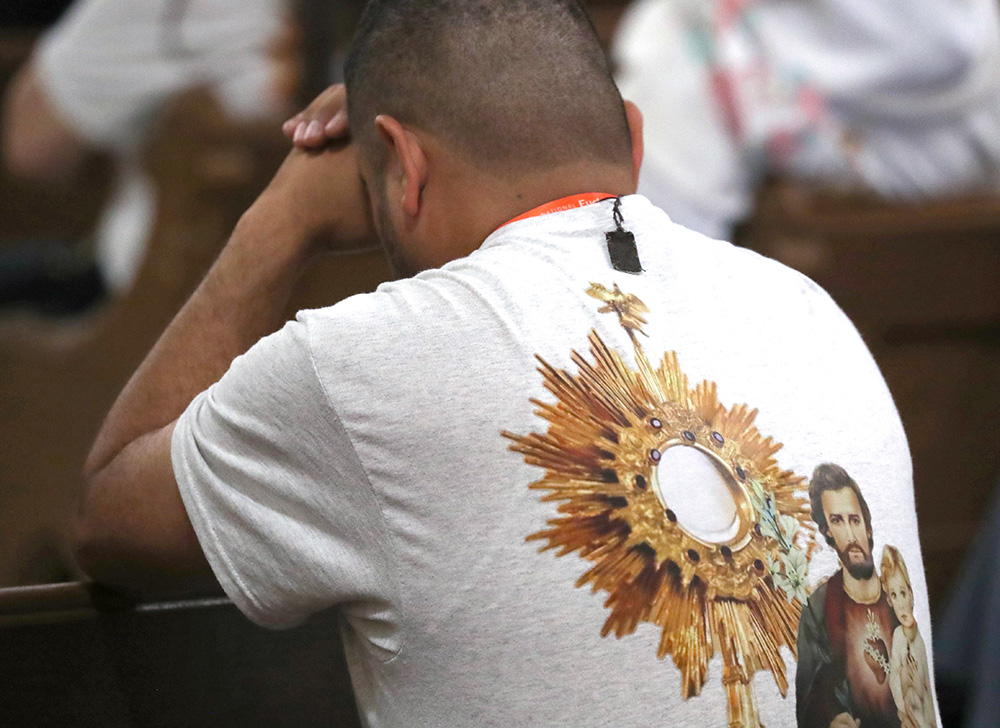
A man prays during perpetual adoration at St. John the Evangelist Church in Indianapolis during the opening of the National Eucharistic Congress July 17, 2024. (OSV News photo/Bob Roller)
"Are you satisfied?" A bishop or his representative asks some version of that question to each person who wants to make vows as a religious.
The intent is to be certain that the person is acting in freedom. It's not a question of being perfect or perfectly free or happy; it's a question about whether the person genuinely desires to make such a commitment. Being satisfied in this sense indicates that the person believes that being a member of this community will provide their best way to grow in relationship with God and call them forth to be all they can be in service to others.
In today's Gospel, we hear that the sight of a hungry crowd led Jesus' disciples to feel their inadequacy — it was not just that they did not have enough, but they felt that they were not enough. Then, Jesus blessed the little that comprised everything that they had. Working with him, there was enough to satisfy a large crowd with an abundance left over. There's more than one miracle embedded in this account.
The real heart of the Scriptures for today comes from Paul's first letter to the Corinthians. Paul had just denounced what he probably would have named the "so-called Christian" community in Corinth. The Corinthians were diverse in social class, finances and, of course, experience.
When they came to celebrate the Lord's Supper, the wealthy, those who didn't have to work from sun to sun, would arrive at their eucharistic meal long ahead of the laborers and begin to enjoy the best of the banquet, often leaving only leftovers for their poorer sisters and brothers. Paul warns that people who celebrate like that not only do more harm than good but actually become guilty of destroying the body and blood of the Lord (1 Corinthians 11:17-22, 27).
This background explains the meaning of Jesus' words, "do this in memory of me." Too often we take this command out of context, assuming that Jesus wanted us to repeat a ritual. Rather, "this" refers to how Jesus gave his body and blood for others, something far more demanding than reciting certain prayers and performing particular gestures.
Our first reading features the obscure priest Melchizedek. He was the king of Salem, a name connected to Shalom, meaning that he was the king of peace. He may well have been a worshipper of the god Zedek. His name occurs in only three books in the Scriptures: today's selection from Genesis, Psalm 110 and the Letter to the Hebrews, which mentions him in relation to Jesus, the last high priest.
What made him important to the early church was his use of bread and wine as part of blessing Abram. Yet that was hardly unusual; bread and wine were the stuff of every day.
This may be the very point of mentioning him. Unlike great kings and specially dressed religious leaders, he used the simplest thing possible, like the bread and fish of our Gospel, to offer his welcome and blessing to Abram and his traveling clan.
Advertisement
Traditionally, we celebrated this feast with processions and adoration of the Blessed Sacrament. In the past, when Catholics were a denigrated minority in many parts of our country, those processions expressed pride in our faith, publicly proclaiming belief in Christ's real presence in the community through the Eucharist.
Eucharistic adoration invites people into quiet, meditative time that is so lacking in this world, a world that Pope Francis described in Laudato Si' as caught in an ongoing process of "rapidification" which makes their lives unceasingly hectic. Time for quiet in the presence of God is balm for the soul and a privileged entryway into an ever-deepening relationship with God.
These practices offer us significant, communal prayers, gestures and songs that express our thanks to God with mind, heart and body. At the same time, our readings call us to allow our worship, especially our eucharistic worship, to mission us to the world as the body of Christ.
What if we considered our everyday activities as being like a procession manifesting the presence of Christ among us? Just as we process with the host, might we make ourselves monstrances on the streets, showing the world our faith and God's love for the world? We can do that only through participating in the life and love of Christ. As St. Augustine would as he distributed the Eucharist, receive what you are and be what you receive.
This sharpens our eucharistic acclamation, "When we eat this bread and drink this cup, we proclaim your death, O Lord, until you come again." Letting our lives proclaim Christ's death and resurrection is our vocation. In this, we become all that we can be as human beings. Let us not be satisfied with anything less.





